 Petzlover
Petzlover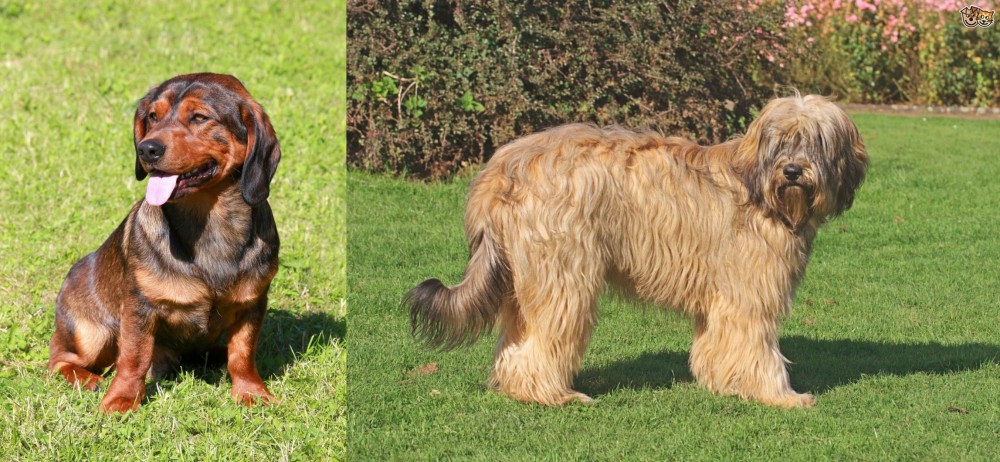 Alpine Dachsbracke is originated from Austria but Catalan Sheepdog is originated from Spain. Alpine Dachsbracke may grow 15 cm / 5 inches shorter than Catalan Sheepdog. Alpine Dachsbracke may weigh 7 kg / 15 pounds lesser than Catalan Sheepdog. Both Alpine Dachsbracke and Catalan Sheepdog has almost same life span. Both Alpine Dachsbracke and Catalan Sheepdog has almost same litter size. Both Alpine Dachsbracke and Catalan Sheepdog requires Moderate Maintenance.
Alpine Dachsbracke is originated from Austria but Catalan Sheepdog is originated from Spain. Alpine Dachsbracke may grow 15 cm / 5 inches shorter than Catalan Sheepdog. Alpine Dachsbracke may weigh 7 kg / 15 pounds lesser than Catalan Sheepdog. Both Alpine Dachsbracke and Catalan Sheepdog has almost same life span. Both Alpine Dachsbracke and Catalan Sheepdog has almost same litter size. Both Alpine Dachsbracke and Catalan Sheepdog requires Moderate Maintenance.
 They are aggressive enough for hunting and tracking large animals as well as small, but they are gentle enough to bring an injured animal back to the hunter without hurting it more.
They are aggressive enough for hunting and tracking large animals as well as small, but they are gentle enough to bring an injured animal back to the hunter without hurting it more.
At one time the breed was a crown favorite, accompanying Prince Rudolph of Habsburg on his hunting excursions. The Alpine Dachsbracke is still a favorite hunting breed but is now more often found as a family pet.
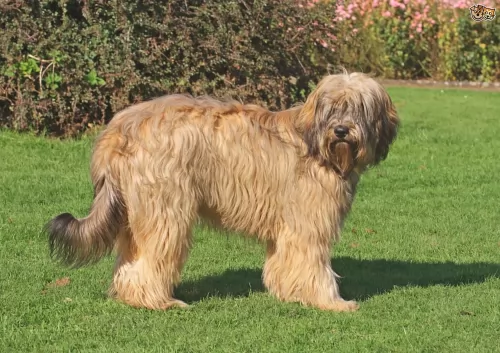 The Catalan Sheepdog, known also as the Gos d’Atura, hails from Catalonia, Spain. It is believed that the dog is related to the Portuguese- and Pyrenean Sheepdogs.
The Catalan Sheepdog, known also as the Gos d’Atura, hails from Catalonia, Spain. It is believed that the dog is related to the Portuguese- and Pyrenean Sheepdogs.
The standard for this breed was formulated in 1929. The sheepdog developed during Roman Empire times between 200 and 100 BC already, being used as livestock guard dogs. With the breed dwindling in the 1970s, Catalonian Sheepdog lovers started promoting it, but it remains a rare breed.
 The Alpine Dachsbracke is a short, stocky dog with a long body and short legs. It is big boned and robust with round eyes. It has black toenails and a short, dense red or black coat.
The Alpine Dachsbracke is a short, stocky dog with a long body and short legs. It is big boned and robust with round eyes. It has black toenails and a short, dense red or black coat.
The bridge of his nose is straight with a strong muzzle. Its forehead has a well defined furrow and black lips and nose. He is muscular and his chest is broad and deep. He holds his tail high and has a trotting gait.
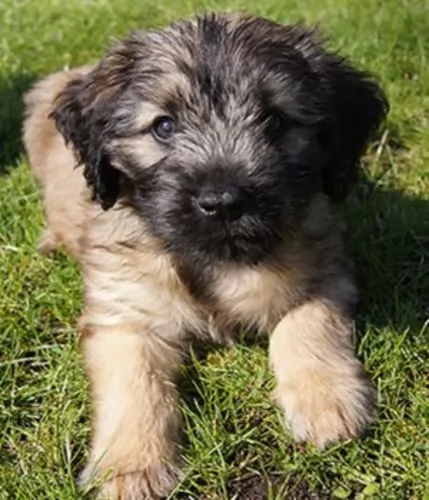 The Catalan is a medium sized dog but gives the impression of being bigger than he actually is. He stands from 45 – 55cm in height and weighs between 20 to 25kg.
The Catalan is a medium sized dog but gives the impression of being bigger than he actually is. He stands from 45 – 55cm in height and weighs between 20 to 25kg.
This breed also has double dew claws on the hind feet. He has a long coat which is slightly wavy and available in different shades such as fawn to brownish to dark grey to black. He has floppy, feathery ears and a fairly long, feathery tail. He has quite a bit of hair on he face too, so you’ll notice a beard, moustache as well as hair which covers the eyes somewhat.
Brave and courageous, the Catalan Sheepdog is also intelligent, active and hardy. He has a round face with a friendly, amicable expression. He is totally pleasant and sweet natured. However, in his role as guardian of sheep he took his role seriously, forming a strong relationship with both shepherd and sheep.
He is wary of strangers. Early socialization and training is always important, and while he makes a wonderful family pet, this training and socialization makes him more relaxed and obedient and he gets on well with children in the home as well as with other pets. While he is a placid, docile and gentle pet, he is also looked upon as a protector, and will defend his family.
 The Alpine Dachsbracke is a very lovable family dog even though he was bred to hunt and scent. They are great with kids and at their size are still good apartment, inside dogs. Though they need daily exercise they don’t need a large fenced in yard.
The Alpine Dachsbracke is a very lovable family dog even though he was bred to hunt and scent. They are great with kids and at their size are still good apartment, inside dogs. Though they need daily exercise they don’t need a large fenced in yard.
They are brave, intelligent and with a lot of stamina for the hunt or the walk. Take them on a hunting trip and they will adore you for it. Though they have plenty of power and endurance, they are not aggressive. However they are fearless and proud and need a strong pack leader for their human companion.
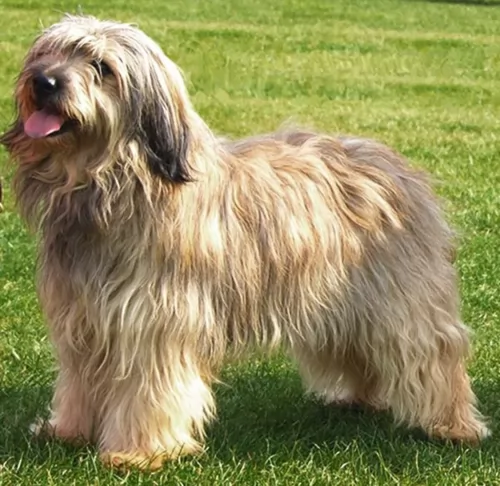 The Catalan Sheepdog is such an amicable character – he is going to make an awesome pet. He is an intelligent and obedient dog and is easily trained.
The Catalan Sheepdog is such an amicable character – he is going to make an awesome pet. He is an intelligent and obedient dog and is easily trained.
He has been used for guarding- and herding work and as a family pet makes a excellent guard dog as well. Capable of being gentle too, he is everything his human family wants him to be and just becomes a regular member of the family.
 They were bred to hunt and so are active dogs needing daily exercise and long walks.
They were bred to hunt and so are active dogs needing daily exercise and long walks.
They are at risk for back problems being long-backed dogs. The most common type of back problem is Intervertebral Disc Disease. This can cause pain and paralysis and can be caused by jumping, obesity or intense exercise.
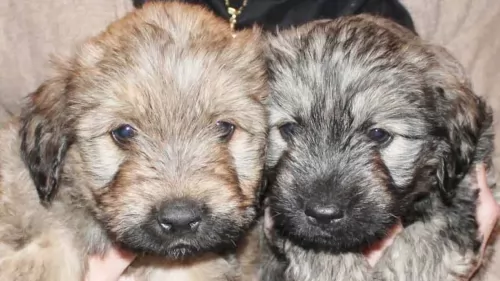 The Catalan Sheepdog is a fairly healthy breed and has a life expectancy of 12, 13 or 14 years. Nonetheless you will still need to watch out with common dog ailments with him, particularly hip dysplasia.
The Catalan Sheepdog is a fairly healthy breed and has a life expectancy of 12, 13 or 14 years. Nonetheless you will still need to watch out with common dog ailments with him, particularly hip dysplasia.
This is a joint and hip disease which can start with symptoms from 6 months of age already. Your dog will be hesitant to play and jump, doesn’t like to go upstairs, tires easily during a walk and develops a hop-like way to walk. You’ll notice that when he lies down, he battles to- or is reluctant to get up again.
X-rays may be required to confirm the diagnosis of hip dysplasia. There are different treatment options, all with the wellbeing of your pet in mind. You don’t want him to have a life of pain and lameness.
 Whether a puppy or adult the breed is subject to obesity and needs to be fed a good, vitamin filled dry dog food. At the same time they need the calories if they are active or hunting.
Whether a puppy or adult the breed is subject to obesity and needs to be fed a good, vitamin filled dry dog food. At the same time they need the calories if they are active or hunting.
About one quarter to one half cup twice a day.
About one half cup twice a day until they become seniors or less active then reduce to a fourth of a cup twice a day.
The Alpine Daschbracke was bred to work. He needs exercise at least a couple times a day.
This breed is playful and loves to find and retrieve. Daily exercise is essential.
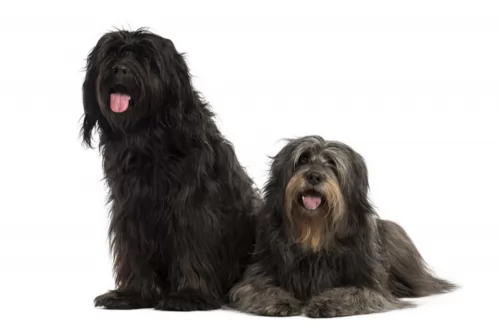 The Catalan Sheepdog is a working breed, so he is going to need plenty of exercise. While he adapts easily to city- or country life, it will be to his benefit to have a garden to romp in. You will still need to take him for walks and play ball- and rope games with him. This will prevent boredom and destructive behavior from him.
The Catalan Sheepdog is a working breed, so he is going to need plenty of exercise. While he adapts easily to city- or country life, it will be to his benefit to have a garden to romp in. You will still need to take him for walks and play ball- and rope games with him. This will prevent boredom and destructive behavior from him.
The Catalan Sheepdog has long hair so he will need to be brushed twice a week to avoid matting. This will help to remove loose hair too, but also distribute natural oils through his coat, keeping his hair and skin healthy and free from skin rashes and itchiness.
This brushing ensures other benefits as you can simultaneously check him for parasites such as fleas and ticks.
If you feed him commercial dog food, make sure its a high quality one. He is an active breed so will require high protein. Give him some homemade rice, vegetables and meat, and include raw meat in his food from time to time too. Always ensure that there is fresh, cool water constantly within reach.